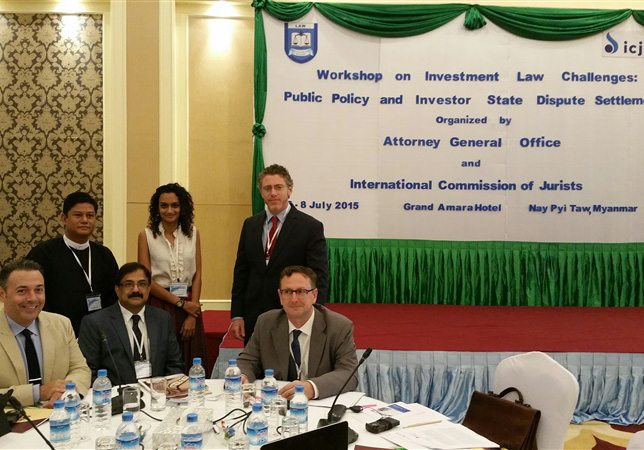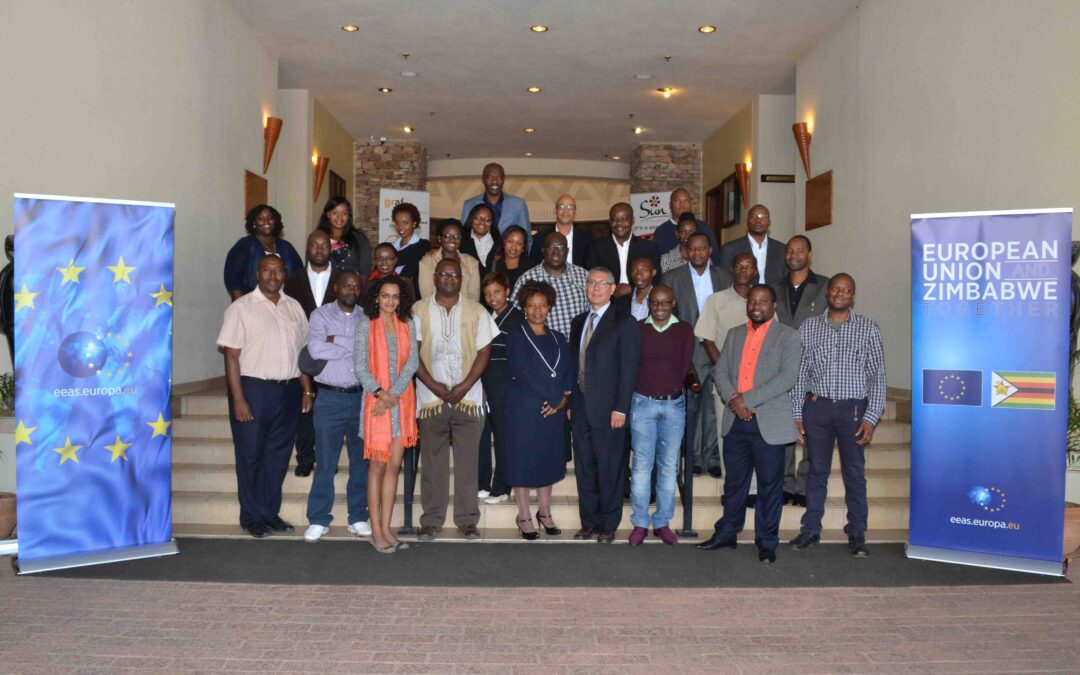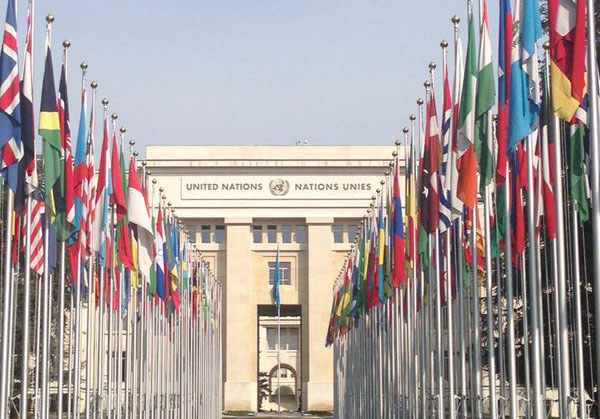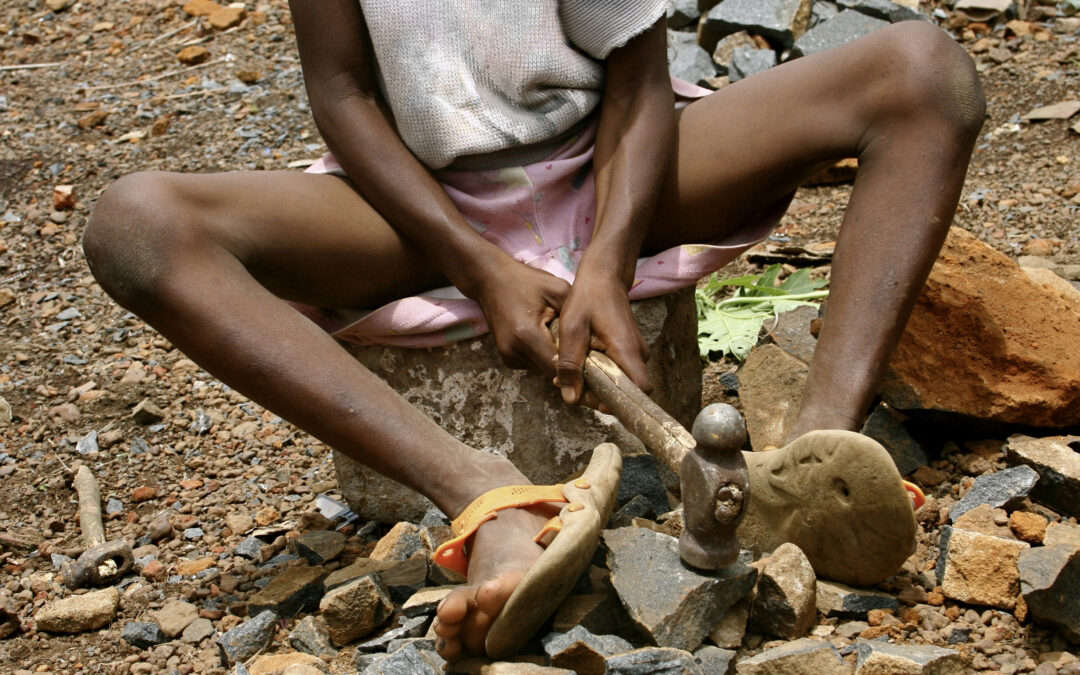
Jul 8, 2015 | News
The ICJ held a successful workshop with the Office of the Attorney General (OAG) on ‘Investment Law Challenges: Defending Public Policy in Investor State Arbitration’.
The event took place in Nay Pyi Taw from 6 to 8 July 2015 and was attended by 60 participants from the OAG and other Ministries.
The workshop was designed to raise awareness about Myanmar’s human rights obligations in relation to investment and to build the OAG’s capacity to draft law that carves out regulatory space for public policy making.
The workshop also prepared the OAG for challenges to public policy through arbitration with a moot court exercise.
The topic is timely as Myanmar rushes to draft new investment law and sign Bilateral Investment Treaties that give investors standing to challenge public policy promoting and protecting human rights.
In opening the workshop, Director General U Kyaw San spoke of the rapid increase of investment in Myanmar and the corresponding changes in its regulatory system.
Dr. Na Chi Oo, a speaker for the OAG, outlined the challenges this poses to the drafting of new public policy.
Participants heard from ICJ Commissioner Prof Andrew Clapham who discussed globalization, investment arbitration and public policy.
He examined the use of human rights law in investment arbitrations.
Guest speaker Prof. Anthony Daimsis introduced bilateral investment treaties and highlighted provisions that can restrict state regulatory space.
Prof. Errol Mendes gave examples of international cases in which public policy has been challenged.
Ms. Harpreet Kaur Dhillon, from the Centre for International Law, National University of Singapore gave practical advice for drafting law that protects the regulatory role of the state.
Dr. Daniel Aguirre, ICJ Legal Adviser, added that “Myanmar needs to update its regulatory system to protect the environment and human rights. It must make sure it does not sign away its regulatory role through investment law and bilateral treaties.”
The event culminated with a moot arbitration exercise where OAG participants engaged in a mock consultation process and a simulated arbitration over a public health policy.
The ICJ was impressed by the interest and genuine commitment of the participants to promote the rule of law and public policy in Myanmar.
The ICJ staff enjoyed open and frank discussion with the Attorney General and is Director Generals on relevant legal developments and looks forward to further discourse.
The ICJ remains committed to provide support in this field in line with the promotion and protection of human rights.

Jul 7, 2015 | Advocacy
The ICJ and 15 other NGOs participating in the first session of the OEIWG to elaborate a treaty on business and human rights highlighted that in principle all conduct by all types of business enterprises, whether local or transnational, shall be addressed in the legally binding instrument.
The footnote in the preamble should not be interpreted as limiting in any way the scope of possible discussions in the Open Ended Intergovernmental Working Group (OEIWG) or any analysis or recommendations that may be reported back to the Council on a future treaty.
Business enterprises that do not have any or any significant transnational operations no doubt are capable of and in many instances have been responsible for human rights abuses no less serious in scale or severity than those of transnational businesses.
The people whose human rights are abused directly or indirectly by businesses are unlikely to distinguish whether the business enterprise that causes them harm has transnational ownership or operations; nor are affected people likely to excuse abuses they suffer from a “local” business simply because the entity lacks a transnational element.
From the point of view of those whose human rights are affected by business activities, the key consideration is not the formal character of the business entity, but instead the their practical access to effective remedy and reparation for the harm they have suffered.
If a treaty is going to take the view and needs of those adversely affected by business activity as a central concern, it must address all business enterprises that can potentially carry out abuses and not only on those with transnational links.
The statement can be downloaded here: Joint Oral Statement on Scope v.2

Jun 24, 2015 | News
The workshop took place from 22-24 June in Victoria Falls and had a special focus on children’s rights as a particularly vulnerable group.
Its primary objective was to create a pool of jurists and activists with the knowledge and ability to undertake strategic litigation before national or regional courts in the interest of victims of human rights abuse by business enterprises in the Southern/Eastern Africa region.
To this end the meeting brought together legal practitioners and Human Rights Defenders involved in human rights legal accountability of business enterprises.
This workshop gathered together a selected group of human rights advocates from Malawi, Zambia, Botswana, Zimbabwe, Uganda, Kenya and Tanzania working on cases relating to business’ human rights abuse.
In East and Southern African countries mining represents a significant part of the national economies and annual GDP.
Tanzania, Malawi, Zambia, South Africa, Botswana and Mozambique have seen the inflowing investments grow in recent years, but it is not clear that this trend has meant improvements in the realization of human rights, especially economic and social rights.
Child labour is endemic, and its occurrence in tobacco plantations subject children to additional hazards to their health and wellbeing.
Mining and oil exploration creates problems to local communities who are not properly consulted or benefit from the activity and usually bear the brunt of environmental degradation and pollution associated with those extractive industries.
Business enterprises are in many instances complicit with State’s violations of human rights.
The meeting also sought to provide legal and other tools to community representatives and litigators who want to start strategic litigation in the public interest.
This flows from the realisation that effective remedy and reparation for victims of business human rights abuses, especially in a transnational context, remains elusive as ever and confronts a series of legal and procedural obstacles.
Access to effective remedy and justice is a priority objective in the context of work relating to the human rights responsibilities of business enterprises.

Jun 19, 2015 | Advocacy, Non-legal submissions
Today, the ICJ made a submission to the Human Rights Council’s Working Group on the Universal Periodic Review in advance of the Human Rights Council’s review of Singapore.
In its submission, the ICJ expressed concern about the following:
(1) corporal punishment;
(2) the death penalty;
(3) the continued criminalization of consensual same-sex relations;
(4) corporate accountability for companies registered in Singapore; and
(5) international human rights instruments and mechanisms.
A copy of the submission can be found here:
Singapore-ICJ UPR-Advocacy-non legal submission-2015-ENG

Jun 16, 2015 | Events, News
The ICJ is organizing this workshop from 22 to 24 June 2015 at the Imba Matombo Lodge in Harare, Zimbabwe. The meeting will bring together legal practitioners, judges and prosecutors involved in human rights legal accountability of business enterprises.
The workshop will have a special focus on children’s rights as a particularly vulnerable group, but will cover human rights broadly.
Its objective is to create a pool of jurists with the knowledge and ability to undertake strategic litigation before national or regional courts in the interest of victims of human rights abuse by business corporations in the Southern and Eastern Africa regions.
It specific objectives are to provide legal and other tools to community representatives and litigators who want to start strategic litigation in the public interest ; to provide opportunities to establish a link with international lawyers and groups to help in litigation in other countries ; and to provide information on available resources, mechanisms, and strategies for effective litigation.
Email applications can be sent to Dr Carlos Lopez: carlos.lopez(a)icj.org ; or Otto Saki: otto.saki(a)icj.org









